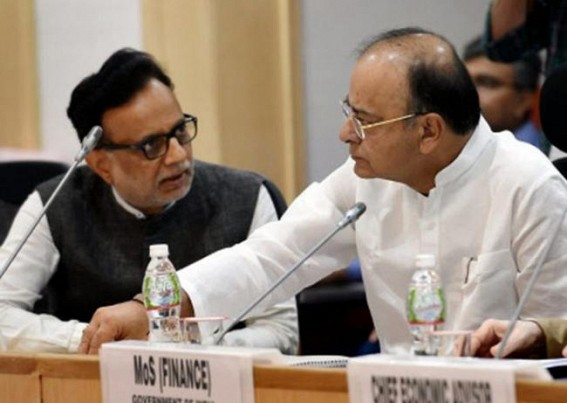TIWN

New Delhi, Dec 23 (TIWN / IANS) The Goods and Services Tax (GST) Council on Saturday decided to form a seven-member Group of Ministers (GoM) to study anomalies in tax collection in some of the states which showed wide deviation from what was expected.
"The Council has approved the proposal to form a seven-member GoM to study the revenue trend, including analysing reasons for structural patterns affecting revenue collection in some of the states," Finance Minister Arun Jaitley said after the meeting.
The study would include the underlying reasons for deviation from revenue collection targets vis-a-vis original assumptions discussed during the design of the GST system, its implementation and related structural issues, he said.
"There is improvement in many states, but we are behind target because we have a very stiff target. From the base year 2015-16, three increases of 14 per cent compounded annually, this year's target would be nearly 50 per cent above the base year. Falling short of target by 5 to 10 per cent is due the stiff target," he said.
However, Jaitley said the shortfall in GST collection would be made up by higher direct taxes and non-tax revenue, which are moving ahead of the schedule, and that the government is confident of meeting the fiscal deficit target of 3.3 per cent.
He said the GST collection in consuming states of North East, along with manufacturing and consuming states like Maharashtra and West Bengal showed significant improvement. Even Bihar that had a higher VAT percentage introduced in base year 2015-16 due to imposition of prohibition showed significant improvement.
"Even the lagging states showed improvement in the second year compared to first year of GST launch. Some states did not have improvement and it was decided to study those," the minister said.
Lagging states Bihar and Meghalaya improved their collection by 18 per cent, J&K by 11 per cent, Jharkhand 10 per cent, Rajasthan 8 per cent, Odisha 6 per cent and Chhattisgarh 5 per cent. Deficits fell from 26 to 17 per cent in Madhya Pradesh and 30 to 19 per cent in Tripura.
States that did exceedingly well are Mizoram, Arunachal Pradesh, Manipur, Telangana, Uttar Pradesh, Andhra Pradesh, Maharashtra, Sikkim, West Bengal, Tamil Nadu, Nagaland and Assam. They either turned positive or are within 1-6 per cent of their target.
States that could not improve their GST collections compared to last year are Puducherry, Himachal Pradesh, Uttarakhand and Punjab. Kerala and Gujarat maintained status quo.
"Overall, there is increment. The first year average was about Rs 89,000 crore a month, the second year average is around Rs 96,000 crore to Rs 97,000 crore. We would have been happier had the increase been higher but we have to factor in the fact that for hundreds of commodities the GST regime has brought the rates down. GST has not raised a single rate."
Jaitley said pan-India the revenue would have been higher on higher manufacturing revenues but the shortfall in services largely due to excessive competition in two sectors of telecom and airlines that the GST collection was adversely impacted.
While he said the GST Council cannot do anything about the two sectors but plans to take up the other two reasons that led to a lower collection in January meeting. These are taxation of residential property and extension of composition scheme to small service providers.
As for the GOM to analyse the collection shortfall among states, he said it would be assisted by a committee of experts from the Central and state governments and the National Institute of Public Finance and Planning (NIPFP).
The GoM in turn would give its recommendation to the GST Council. The members of the GoM and the committee of experts would be announced in due course of time.
- India’s industrial growth at 3.5 pc in July signals healthy recovery: Economists
- AI to unlock $500 billion opportunity for India’s tech services: Report
- India’s credit rating upgrade to boost investors’ confidence, drive foreign capital inflows
- Centre to update WPI, IIP; announces launch of new Producer Price Index
- S&P Rating's growth projection for India is no surprise: SBI Research



